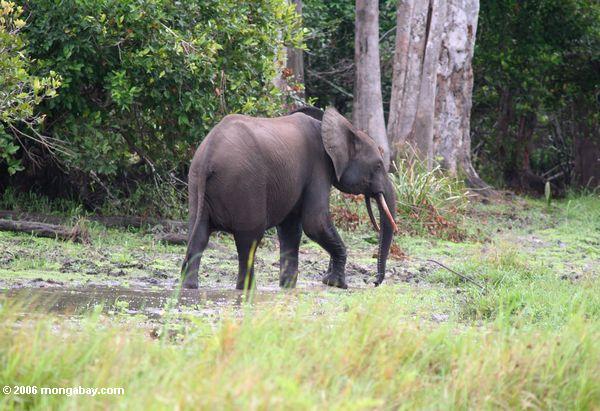Forest elephant (Loxodonta cyclotis) in Gabon. Photo by: Rhett A. Butler.
The government of Gabon has announced it will burn its stockpiles of ivory later this year in a bid to undercut illegal elephant poaching, which is decimating populations in central Africa.
“The burning of a country’s entire ivory stockpile will be an historic conservation event in Africa, and a strong deterrent signal for all the actors in the illegal wildlife chain trade,” said Natasha Kofoworola Quist with WWF Central Africa in a press release.
Ahead of burning the stockpile, Gabon is conducting an independent inventory of its ivory by experts from WWF as well as TRAFFIC.
Elephant poaching is on the rise in Africa, especially plaguing populations in central Africa. Researchers estimate that up to 12,000 elephants may be killed by poaching annually in central Africa alone, but hard data is difficult to come by. Poached ivory is smuggled from Africa to East Asia where it is carved into decorative items.
Recently, a group of poachers on horseback decimated elephant populations in Cameroon’s remote Bouba Ndjida National Park with impunity. Over 400 elephants were killed over several weeks, before the Cameroonian military was called in.
“If Gabon’s lead is replicated region-wide, we could see real progress being made in tackling elephant poaching and putting the criminal syndicates behind it out of business,” said Stephane Ringuet, TRAFFIC’s Central African Director who is inventorying Gabon’s ivory.
African elephants are currently listed as Vulnerable by the IUCN Red List. However, scientists have recently found that there are likely two species of elephant in Africa: the more common savanna elephant (Loxodonta africana) and the forest elephant (Loxodonta cyclotis), which inhabits the Congo rainforest. The forest elephant is smaller than its savanna cousin and sports straighter tusks. It is also likely more endangered due to poaching.
Related articles
Banning ivory sales to China could save elephants
-EIA.150.jpg)
(03/24/2012) Although the international ivory trade has been banned since 1989, last year was the worst ever for elephant poaching, and this year has begun little better as reports come out of Cameroon of hundreds of elephants slaughtered in a single park. What went wrong? According to a new briefing by the Environmental Investigation Agency (IEA), approved legal auctions of ivory by the Convention on International Trade in Endangered Species (CITES) to Japan and, especially, China has fueled, rather than abated as promised, the illegal trade along with mass deaths of elephants across Africa.
New reports from inside Cameroon confirm grisly mass killing of elephants (warning: graphic photos)
(03/14/2012) The International Fund for Animal Welfare (IFAW) has recently returned from Bouba Ndjida National Park in northern Cameroon, where at least 400 elephants have been slaughtered since mid-January. IFAW is the only international organization that has assessed the situation within the park.
Military called in to stop Cameroon elephant slaughter – but may be too late
(03/05/2012) Cameroon’s military has been called in to Bouba Ndjida National Park to take on foreign poachers that have slaughtered hundreds of elephants for their ivory, according to the World Wide Fund for Nature (WWF). Reports vary, but between 200-480 elephants have been killed in recent weeks in the park by what is widely assumed to be poachers from Sudan.
Elephant death-toll rises to almost 500 in one park in Cameroon (warning: graphic photo)
(02/29/2012) Wildlife officials have found 458 dead elephants in Cameroon’s embattled Bouba Ndjida National Park, reports the AFP. However officials fear the actual number is even higher around 480. Over the last six weeks a well-organized group of poachers has run free in the park, slaughtering elephants for their ivory tusks which will make their way to markets in Asia.
Elephant massacre in Cameroon (warning: graphic photo)
(02/17/2012) More than 200 elephants have been slaughtered for their tusks in less than a month in Cameroon, reports the International Fund for Animal Welfare (IFAW). The group blames Sudanese poachers for cross-border raids from Chad into Bouba Ndjida National Park in northern Cameroon.
Elephant poachers kill unarmed wildlife ranger in Kenya
(01/16/2012) Abdullahi Mohammed, an wildlife ranger, was killed in the line of duty in Kenya this weekend by elephant poachers. A ranger with the conservation organization Wildlife Works, Mohammed was shot by poachers in Wildlife Works Kasigau Corridor project, a REDD program (Reduced Emissions From Deforestation and Degradation).
Forest elephant populations cut in half in protected area
(11/14/2011) Warfare and poaching have decimated forest elephant populations across their range with even elephants in remote protected areas cut down finds a new study in PLoS ONE. Surveying forest elephant populations in the Okapi Faunal Reserve in the Democratic Republic of Congo, researchers have found that the population has fallen by half—from 6,439 to 3,288—over the past decade in the park.

